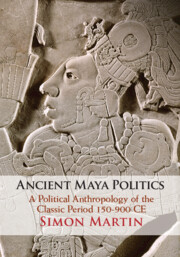Book contents
- Ancient Maya Politics
- Ancient Maya Politics
- Copyright page
- Dedication
- Contents
- Illustrations
- Maps
- Tables
- Case studies
- Preface
- One Introduction: The Questions
- Part I Agendas in Classic Maya Politics
- Part II Epigraphic Data on Classic Maya Politics
- Part III A Political Anthropology for the Classic Maya
- Appendix An Inventory of Emblem Glyphs
- Notes
- References
- Index
One - Introduction: The Questions
Published online by Cambridge University Press: 13 July 2020
- Ancient Maya Politics
- Ancient Maya Politics
- Copyright page
- Dedication
- Contents
- Illustrations
- Maps
- Tables
- Case studies
- Preface
- One Introduction: The Questions
- Part I Agendas in Classic Maya Politics
- Part II Epigraphic Data on Classic Maya Politics
- Part III A Political Anthropology for the Classic Maya
- Appendix An Inventory of Emblem Glyphs
- Notes
- References
- Index
Summary
Few issues are more central to understanding an ancient people than how they were organised politically, a topic that touches on virtually every aspect of their social, cultural, and economic life. Configurations of power are the critical frameworks within which identities, relationships, and events are formed, understood, and function both within communities and in their interactions with others. This was no less true for the ancient Maya, who occupied the Yucatan Peninsula and adjacent highlands to the south, an area now divided between the nations of Mexico, Guatemala, Belize, and the western extremities of Honduras and El Salvador (Map 1; see also Maps 2–4) – today home to millions of their descendants.
Keywords
- Type
- Chapter
- Information
- Ancient Maya PoliticsA Political Anthropology of the Classic Period 150–900 CE, pp. 1 - 12Publisher: Cambridge University PressPrint publication year: 2020

